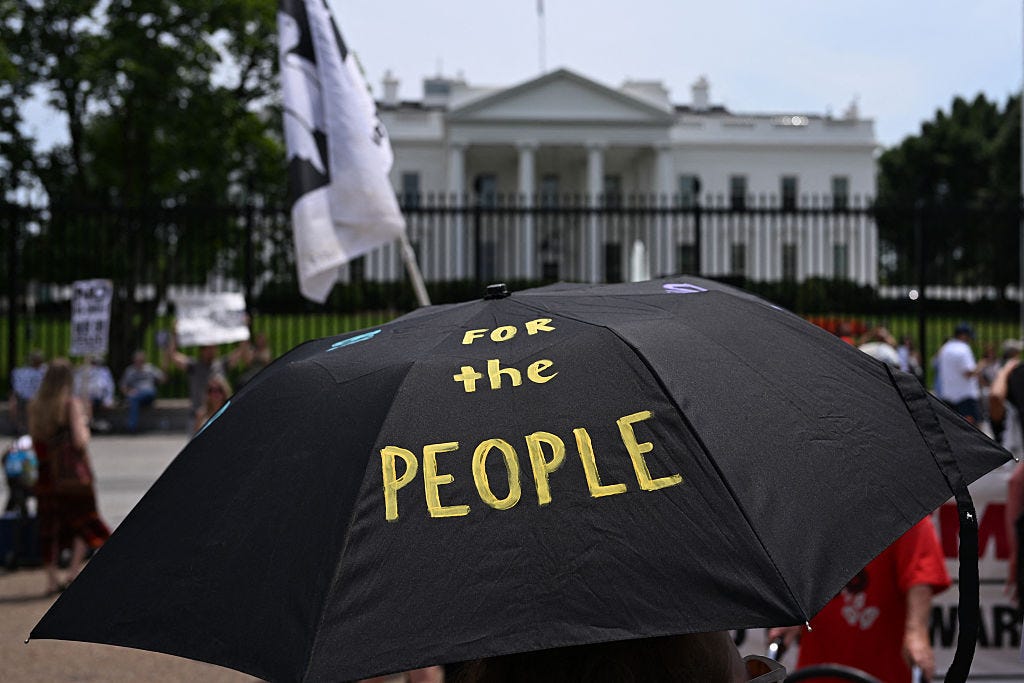Whose life is worth more?
Closing thoughts on "One Day," the wake-up call we didn't know we needed.
Welcome back to The Ink Book Club. Join us today, Wednesday, June 25, at 12:30 p.m. Eastern for one final discussion of One Day, Everyone Will Have Always Been Against This. We’ll meet this week on Zoom (details and a meeting link are at the bottom of this post).
The Book Club is open to all supporting subscribers of The Ink, so join us now to take part!
As we witness the unfolding of a new phase of war in the Middle East, One Day, Everyone Will Have Always Been Against This, by Omar El Akkad, provides an essential lens through which to view these unsettling events. The victims are the Israelis who are being injured and killed; the Palestinians who are being murdered, starved, and violently uprooted; and the Iranians being terrorized and killed by the bombs raining down on them. If we’ve been shrouded in “selective obliviousness,” One Day is a cold plunge into reality.
In their conversation last week, Anand and Omar discussed the “concentric circles of enablement” and the “chasm between the performance and the reality.” And you chimed in. In response to our Sunday post, Kerry wrote that they “have been struggling with what it meant to be an American for at least 55 years.” But, they add, “if we all showed up as who we REALLY were–deep down–our world would be a much kinder place.” Many of you were struck by Omar’s “emanation of pure pain at living with the contradictions of being an American citizen in this time,” as Jan Fels put it. Selena Evans observed that One Day is “one of the most important books I’ve read…it absolutely makes me listen differently to the news and opinions of all stripes.” Kristen L. Held commented that “To say I feel Omar’s pain is the understatement of the century. I just wish I had a clear vision of how to stay sane in what feels like a truly sick and dysfunctional culture and eke out as many moments of joy as possible.”
Thanks for your engagement and your empathy.
So, for our last sit-down together about One Day, here are some of the questions that linger for us.
Over these last few years, have you too experienced a series of disillusionments that have led to a sense of alienation with your government’s actions? If so, where is your breaking point?
How do you interpret the following, from page 87 of the book: “It’s no use, in the end, to scream again and again at the cold, cocooned center of power: I need you, just this once to be the thing you pretend to be.”
What are your concluding thoughts on this book and the experience of discussing it together?
Let us know your thoughts — or any other final reflections and reflections you have on the book and would like to get on the agenda for our conversation later today — in the comments below.
Omar has gifted us with a short reading list that Ink Book Club members who want to know more about the research he did for the book, or are looking for further context, can turn to:
The Hundred Years’ War on Palestine: A History of Settler Colonialism and Resistance, 1917–2017, by Rashid Khalidi
Recognizing the Stranger: On Palestine and Narrative, by Isabella Hammad
Perfect Victims and the Politics of Appeal, by Mohammed El-Kurd
And while “nobody’s ever donated their way out of a genocide,” to quote Omar, here are some organizations he recommends, should you choose to contribute:
Next week, we’ll be moving on to our third Book Club selection, the novel The Uproar, by Karim Dimechkie. We’re giving away 50 copies of the “stressful social thriller” to our supporting subscribers. For a chance to enter, join us today and then fill out the form at the bottom of this post.



